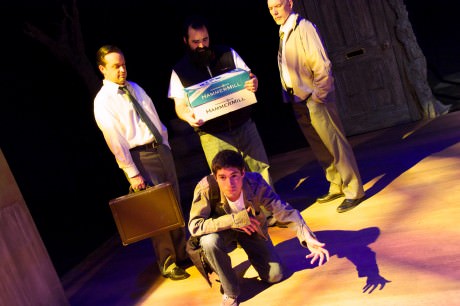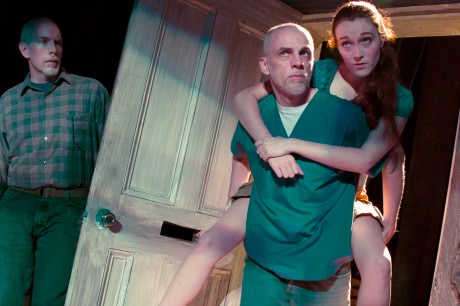This is a cunning conundrum of a play. It moves back and forth in time, sudden lighting changes signal shifts from realistic to magical, the characters speak like superliterate savants, one-line zingers carom among them, the plot is doled out in tantalizing tidbits, the story toys with our rapt attention like a Rubik’s cube in bubble wrap. Yet this is no ordinary brain-teaser. There’s meaning in this enigma. It plays like the best of Pinter except if Pinter had a point.

Confused? Well, you might come to enjoy it. Because if your mind gets as engrossed as mine did during this world premiere play by Kathleen Akerley at Longacre Lea, perplexity may never have seemed such a pleasure.
This much we find out for sure: Six men, all former employees of a law firm, have gone off the grid to live in an intentional community on a property in the woods. The set by Elizabeth McFadden is a rustic retreat amid tree trunks in browns and greens with mismatched chairs and hanging window frames looking out. It’s a sanctuary of sorts, far away from anywhere, but vaguely unsettling.
At the law firm there was a rigid hierarchy. High up in it, as managing partner, was the man who has adopted the nom de nature Frog (Michael Glenn). At the bottom, as photocopier operator, was a young man who has dubbed himself Fiver (Séamus Miller). Ranked in between were men now named Hector (Michael John Casey), Raven (Chris Davenport), Todd (Daniel Corey), and Mal (Daniel Vito Siefring). Their purpose in going rural is to live on the land egalitarianly. A brotherhood of men who are eradicating hierarchy. Escapees from constricting careers, without wives or children or other ties that would preclude their pact to connect.
The basis of these men’s bond is somewhat elusive; it doesn’t appear to do with sex. Akerley’s script has one fleeting reference that might suggest these men even have a sexuality: a lame joke about the word “shaft” that gets only a so-so rise out of the guys. To all intents and purposes, these men comport themselves as campers in the woods with the same asexuality that characterized their workplace interactions. Their minds, and therefore ours, are elsewhere.
But there’s no doubt as to their joint genderedness and their aim to defend it. A beautiful young woman arrives, unnamed in the credits except as She (Kira Burri), limping helplessly because her ankle twisted when she stepped in a nearby hole. The men fumblingly apply ice to the injury and otherwise make a gentlemanly show of trying to help her. But ominously she represents to them an unwelcome incursion from outside. And when the lighting by John Burkland changes dramatically to surreal, she utters curselike incantations of bad things that will befall them.
After she’s gone, the men sing a song, their anthem of cohesion, Scarborough Fair in six-part harmony (“Parsley, sage, rosemary and thyme…”)—and gosh these six actors have great voices.
Abruptly there is a furious banging, another outsider demanding entrance. Turns out to be the girl’s father, unnamed except as He (Jonathon Church). The girl has been shot dead in the head.
Up till then the play has been a scintillating display of oral arguments on a wild array of topics; now it becomes also a fascinating whodunnit. Who shot the girl and why? A detective arrives (Jonathon Church again). He interrogates each of the men. One by one he rules out suspects. Steadily, ineluctably, the men’s communitarian ideals fracture and fall to pieces. And there be shocking plot turns along the way.
Akerley’s shrewd script deserves and got an equally sharp director: Akerley herself. The pacing, the stage pictures, the performances, the whole production—it’s all first rate. Even the complicated scene changes work. They entail placing and removing then placing again certain set pieces in dim light, to signal the house before and after renovation, as time jumps to and fro. The sound design by Neil McFadden covers these transitions and makes them play like intriguing caesuras within a riveting momentum.
The title of this play makes more sense after seeing it than before. At a point Akerley’s characters chat about the radical agrarian socialism that the Cambodian dictator Pol Pot imposed. Their woodsy communal experiment implodes in violence for similar xenophobic reasons. Or something like that. There’s also a lot of Tarot card reading, a talent Fiver contributes to the mix.

The mashup of images and frames of reference that fly about in this brilliantly evasive new play—the law, a reign of terror, mystic fortune-telling, to name a few—can be head-spinning. And following the narrative can be like picking through pieces of jigsaw puzzle. Akerley was once quoted in an interview cheekily paraphrasing from the Dune series: “Exposition is the mind-killer. Exposition is the little-death that brings total obliteration.” So don’t expect straightforward storytelling. And don’t come seeking soppy sentimentality or maudlin heart-string plucking either. This play knows exactly what it’s doing and it’s not that.
Pol Pot & Associates, LLP is a nifty stimulation of brain cells and a buzz-worthy theater treat. If you’re smart you’ll catch it.
Running Time: Two hours and 20 minutes, including one 10-minute intermission.
Pol Pot & Associates, LLP plays through August 31, 2014, at Longacre Lea performing a The Callan Theatre, at The Catholic University’s Drama Complex -3801 Harewood Road NE, in Washington, DC.. Tickets are available online.




